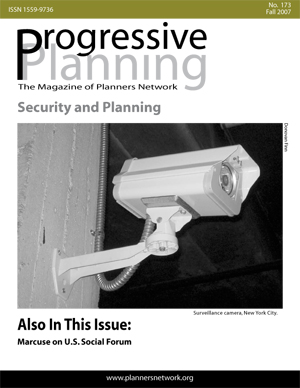By Peter Marcuse
The U.S. Social Forum in Atlanta this July was a major success. There were some 10,000 people in attendance, 951 workshops and four plenaries, along with lots of culture, tents, networking and solidarity. It was amazingly grassroots. Almost everything was bilingual and a range of groups were represented; there were many Hispanic and African-American, homeless, gay and lesbian and youth participants (but few elderly or indigenous). The majority of attendees were probably women, and it was overwhelmingly community-based rather than NGO-dominated (a complaint about the Nairobi World Social Forum). There were relatively few academics present and more activist leaders rather than big-name speakers. There was also much attention to movement-building and leadership training.
Almost every hot-button issue was represented at the forum, including Iraq, health care, immigration, global trade, labor rights, prison rights, indigenous rights, education, Hurricane Katrina and the media. While it was of course overwhelmingly anti-Bush, there was no electioneering. Urban issues, such as housing, were present but not dominant, and they tended to be taken up in themes organized by sector.
If the forum had two purposes, networking and coalition-building, the former succeeded admirably, the latter less so. People working on the same issues came together to share experiences and offer mutual support, and while the plenaries helped bring people together, the scattered locations did not. The idea of the forum is, of course, to be a place for open discussion, not itself an action organization. One of the two efforts that I was aware of to mobilize across issues on a broader action agenda was a remarkable group just founded in January, the Right to the City Alliance. This effort includes twenty-four grassroots activist groups from nine cities. Members include community, immigrant, housing, workers, Asian and gay and lesbian organizations, among others. They are focused on a down-to-earth interpretation of the broad formulation of the right to the city that first emerged in 1968. A few academics and professionals support this movement, but it is clearly led by community activists.
The other cross-issue organizing effort was the Peoples Movement Assembly, which had met parallel to and outside of past forums. It organized regional meetings in Atlanta that brought people together across issues on a regional basis, but the regions are too big, I believe, to be viable (the Northeast, for example, includes Boston to D.C.). A one-and-a-half hour session isn’t enough to get anything done beyond forming a coordinating committee; at least, this was the experience in the one session I was at. There was a general meeting of the assembly on Sunday morning, at which a number of substantive resolutions were passed, but I wasn’t able to be at it. I understand there is ongoing discussion about how to legitimate the resolutions and obtain endorsements from the groups represented.
If in fact there is impetus to having the range of resolutions of the assembly submitted to the many organizations at the meeting, I think it would be a major contribution to broad coalition-building and unity. It would mean each group would consider, debate and vote on resolutions outside of its own particular concern and turf, for example, environmentalists would vote on gender equality, housing groups on civil rights, anti-war groups on health care, etc. That would mean a broadening of all concerns, a giant step forward. The idea of the forum and the assembly as two separate but linked events, with different but related functions, independent of each other but drawing support from each other, seems to me a very desirable development, a way around a tension that has been present in many forum discussions: Is the forum an open space for discussion or is it a movement around a defined agenda?
The two Planners Network sessions I was involved with in Atlanta were reasonably attended, but the competition was fierce and we were placed fairly far from the Convention Center. One, that Amanda Huron led, explored mapping to show urban issues. The other, where I and others in planning spoke, was co-sponsored by Picture the Homeless, a sophisticated grassroots group from New York that had a very impressive group of members there, and had produced a very good report on making empty housing available to the homeless. Both sessions went well substantively. I saw only a handful of PN members that I recognized at the forum, but it was a big rambling three day affair and easy to miss people. It was also very different from the kind of professional, academic or political conferences we generally attend. Every single session (except plenaries) was in a circle, there were never questions to experts and there were no time limits on people speaking in workshops. There was a maximum of stories told and experiences shared, all sometimes at the expense of coherence and information, but almost always productive—and certainly democratic.
I think supporting the kinds of movements and groups represented at the forum is very much along the lines that Planners Network has been moving. They are the ones we should be working for. They can teach us about organizing and can also benefit from some of our planning bag of tricks—tools and analysis.
Peter Marcuse is a faculty member at Columbia University.
